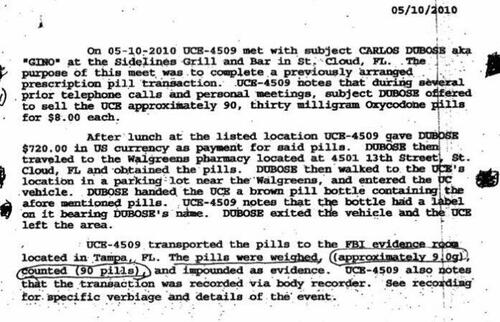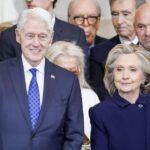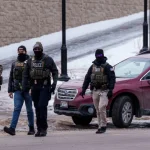
Authored by Ken Silva via Headline USA,
The first article of this series chronicled the FBI’s mid-2000s program to stage neo-Nazi rallies around the country as a means to conduct surveillance and recruit potential informants.

Those rallies were just the beginning of a sweeping multi-state investigation, Headline USA can reveal.
Indeed, after an FBI informant was exposed in 2007 for organizing a Nazi rally in Orlando the year before, the bureau launched another operation in the same area. Dubbed “Primitive Affliction,” the FBI set up a neo-Nazi motorcycle front group to infiltrate Florida’s right-wing underground.
Federal agencies are known to have used motorcycle front groups cases against targets such as the Hells Angels for drug- and gun-trafficking investigations. However, Headline USA is unaware of such a tactic being employed in a politically charged domestic terrorism case until Primitive Affliction.
This publication has also found that then-FBI Director Robert Mueller had a personal interest in Primitive Affliction, which ran from about 2007 to 2012. Indeed, Mueller was briefed daily on the operation during its final stages, according to a newly unearthed performance review of one undercover cop on the FBI’s Joint Terrorism Task Force.
OK I've been promising docs that ties then-FBI Director Robert Mueller to these post-9/11 PATCON-like ops.
— Ken Silva (@JD_Cashless) June 30, 2024
Here's a performance review of an undercover FBI officer in Primitive Affliction, which was centered around a neo-Nazi motorcycle front group.
Mueller was 'briefed daily' pic.twitter.com/dR92lcY9Qm
Because Primitive Affliction collapsed with no terrorism convictions, the case never grabbed the national spotlight. However, a deeper look at the case reveals infiltration and entrapment techniques used by the FBI in 1990s investigations against the Aryan Nations, as well as more recent cases such as the 2020 militia conspiracy to kidnap Michigan’s governor.
Mueller did not respond to an email about Primitive Affliction. The FBI declined to comment.
Reviving the Aryan Nations
In the 1980s and 90s, the Aryan Nations rivaled the Ku Klux Klan as the face of “white hate” in America—and for good reason, having been linked to numerous bank robberies, the assassination of a Jewish radio host and the Oklahoma City bombing, along with other crimes.
But by the mid-2000s, the Aryan Nations was largely decimated by numerous arrests and civil litigation. The group had splintered into various factions around the country. One of its remaining leaders, August Kreis, was desperate to consolidate power.
Working out of a South Carolina mobile home with a man named Joshua Caleb Sutter—who was a known FBI informant since 2003—Kreis attempted several publicity stunts to put his name on the map.
For example, at one point Kreis pledged allegiance to Osama bin Laden and claimed to seek an alliance with Muslim jihadists. Sutter, who was Kreis’s “minister for Islamic liaison,” also reportedly posted a “message of solidarity and support” to Saddam Hussein on the Aryan Nations Web site. (If Sutter’s name sounds familiar, it’s because he made headlines in 2021, when it was revealed that he earned more than $100,000 from the FBI while running a Satanic publishing house.)
When that didn’t work in attracting new members or donations, Kreis began plotting with another Aryan Nations member, Robert Killian. Like Sutter, Killian turned out to be undercover law enforcement—Killian an undercover cop on the FBI’s JTTF.
An avid motorcyclist living in Orlando, Killian had been hanging out at a local Outlaw biker bar while posing online as a member of the Aryan Nations. Using the name “Doc,” by 2007 he had risen to become the Aryan Nations Florida state administrator—which, ironically, gave him power to vet applicants. The Orlando Sentinel later described Killian as the Aryan Nations’ “top recruiter.”
Apparently, someone in the FBI had the idea of merging a domestic terrorism case with a biker case. Killian planted the idea in Kreis’s head to start a neo-Nazi motorcycle club, the 1st SS Kavallerie Brigade Motorcycle Division—named after a horse-mounted unit of Nazi Germany’s Waffen-SS.
For Kreis, a biker gang posed the opportunity to attract publicity, gain members and increase revenue for the Aryan Nations.
But first, they needed bikers. To that end, Killian convinced an Outlaw biker named Brian Klose to become the leader of the 1st SS Kavallerie. According to people familiar with the matter, Killian was able to convince Klose to leave the Outlaws by playing to his ego. Keeping with the neo-Nazi theme, Klose was named “Fuhrer” of the new group.
Klose would come to regret his decision to leave the Outlaws for what turned out to be an FBI front group.
With Klose surrounded by a gaggle of informants and undercover cops, the 1st SS Kavallerie clubhouse was open for business. According to internal law enforcement records, there were at least four undercover employees and an untold number of informants who infiltrated the group, along with numerous wiretaps and other “sophisticated techniques.”
Kelly Boaz a.k.a. ‘Kevin Post’
One of the key undercover agents from Primitive Affliction was Kelly Boaz, a local Orange County cop who, like Killian, had earned a spot on the FBI’s JTTF—receiving specialized training from the ADL and SPLC, according to their personnel records.
Boaz earned a JTTF assignment despite a scandal-plagued career with the Orange County Sheriff’s Office, where he was the subject of more than a dozen internal investigations since joining in 1989, several involving allegations of excessive force.
Meet undercover FBI officer Kelly Boaz, who features in Part 2 of The Hidden History of Robert Mueller’s Right-Wing Terror Factory
— Headline USA (@HeadlineUSA) June 30, 2024
Boaz posed as renegade Black Pistons bomb-maker "Kevin Post" in Primitive Affliction
Boaz made it to the FBI's JTTF despite a checkered career as… pic.twitter.com/MYUn6w1Nfl
In December 1999, for example, Boaz was involved in a predawn raid where another officer shot a suspect. Months later in August 2000, Boaz was at the center of another controversy when he shot and killed an unarmed thief at a shopping center.
He was cleared of wrongdoing in both incidents, but his supervisor was reportedly demoted and his racketeering squad was disbanded. A civil lawsuit was filed against him and the Orange County Sheriff’s Office over the December 1999 incident, but the case was eventually dismissed.
Despite Boaz’s controversial past, the FBI relied on him to build a complex case against a supposed network of white supremacist terrorists.
Boaz, who declined an interview request, entered Florida’s neo-Nazi scene sometime after the Orlando neo-Nazi rally organizer, FBI undercover operative David Gletty, had his cover blown in the media—as detailed in Part 1 of this series.
According to court records, Boaz was introduced to the Outlaw bikers and the 1st SS Kavallerie in 2009 by his colleague, Killian. By then, Boaz had already infiltrated the Black Pistons biker gang and was posing as one of its members, a renegade bomb maker named “Kevin Post.”
For nearly the next three years, Boaz and the FBI built their case.
During his investigation, one of his informants purportedly learned about another right-wing group in the area called the American Front. Operation Primitive Affliction eventually expanded to the Russia-linked American Front, which will be the subject of Part 3 of this series.
In both cases, Boaz made extravagant claims of the drug deals and terroristic plots he witnessed in his roughly three years as an undercover biker/bomber. He also claimed that his life was threatened when an Outlaw biker put a firearm to his head and accused him of being law enforcement.
Mueller likely heard similar reports. A glowing performance review for Boaz said the case “was briefed to the FBI Director daily during the executions of the disruptions.”
But a deeper look at the evidence produced in court casts doubt on Boaz’s claims, as well as the FBI’s entire case.
Kavallerie Collapse
“Biker Gangsters Busted after Three-Year Probe,” the Orlando Sentinel reported on March 31, 2012.
Two nights earlier, Boaz and the FBI had rounded up the targets of Primitive Affliction. One of those arrested was a woman named Deborah Plowman, who was at her home near Chicago when more than a dozen armed agents swarmed her on March 29, 2012. According to Boaz, he saw Plowman take pills at an Outlaw bikers party several years earlier.
After spending the night in jail, Plowman was told she needed to travel to Florida to face drug-trafficking charges—or else, she’d face extradition. Baffled, Plowman professed her innocence.
She was telling the truth.
On April 19, 2012, Plowman turned herself into law enforcement in Florida to be interviewed by Boaz. It didn’t take long before Boaz realized that he had the wrong person arrested.
“Boaz asked [Plowman] if she has ever used the nickname or has ever been called ‘Sin,’ to which she replied with a ‘no,’” Plowman said in a lawsuit she filed later over the wrongful arrest.
“Defendant Boaz immediately began to break out into a sweat upon viewing and questioning [Plowman], realizing he caused the wrong person, [Plowman], to be arrested in his undercover operation, instead of ‘Sin’ [Kristy Pryzbylla].”
It turned out, Plowman was married to someone Boaz had been investigating, and the undercover agent somehow confused her with Pryzbylla. Plowman quickly hired a lawyer, who blasted Boaz in the Orlando Sentinel for his carelessness.
“Had Boaz pulled her drivers license, he would have known it wasn’t her, and he’d made a huge mistake,” Plowman’s then-attorney, Jerry Theophilopoulos, said at the time. “In all my 20 years of practice, I’ve never seen anything like what they did to Deborah Plowman.”
Plowman had her charges dropped in May 2012, and she eventually won $30,000 from Boaz in a civil lawsuit.
Boaz’s sloppy police work would continue to rear its ugly head as the fruits of Primitive Affliction moved through the courts.
The other defendants—including the “Fuehrer” Klose, Ronald Cusack, Carlos Eugene Dubose and Harold Johnson Kinlaw—were initially charged with violent crimes, such as bomb-making and soliciting murder. However, prosecutors later dropped most of the charges related to violence, instead reaching deals with the defendants to plead guilty to drug charges.
Assistant State Attorney Steven Foster reportedly said at the time that prosecutors were willing to strike plea deals with alleged white supremacist extremists because they were following the “Al Capone theory of prosecution”—referencing how federal authorities jailed the notorious mobster for tax evasion instead of his countless violent crimes.
“We decided to strike against the Kavallerie Brigade by bringing these heavy-duty drug charges to shut the active members down,” Foster reportedly said, bragging about shutting down an FBI front group.
However, one of the Outlaw biker defendants, Dubose, fought his charges.
It was a good thing he did.
A retired U.S. Marine, Dubose’s crime stemmed from when he cracked his skull in a motorcycle accident. Down and out on his luck and looking for cash, Dubose took another blow in life when an FBI informant arranged for him to sell his prescription painkillers to an undercover officer.

Initially charged with selling more than 28 grams of Oxycodone pills, Dubose could have spent the rest of his life in prison. But when he started receiving pre-trial discovery, he noticed something: An FBI report showed he only gave the undercover officer 9 grams of pills—a crime that carried the far lesser max sentence of seven years imprisonment.
After successfully diminishing the severity of his drug charge, Dubose decided to plead guilty to that lone count. But he continued to vociferously deny any involvement in a bomb plot—a charge that stemmed from a conversation he had with Boaz, aka renegade bomb maker “Kevin Post,” nearly three years earlier in 2009.
To Dubose’s point, the Feb. 27, 2009, conversation he had with Boaz/Post never developed any further over the next three years. And a transcript of the conversation shows Dubose choosing his words carefully when talking about “hypothetically” building a pipe bomb: “We’re not lookin’ to do anything. It’s just a matter if we start to go to war with somebody,” Dubose told Post/Boaz at the end of the discussion.
Florida prosecutors admitted that Boaz’s one recorded conversation didn’t contain smoking-gun evidence of bomb plots, but they claimed there were other discussions where Dubose made such plans.
Even though there were no recordings of those other purported conversations—and even though Dubose never possessed or attempt to build a bomb—the judge accepted the narrative of Boaz and the government. He tossed the motion to dismiss, and Dubose took a plea deal soon thereafter.
Gun to the Head?
Boaz’s credibility would be challenged once more at Dubose’s April 21, 2014, sentencing hearing, where the undercover agent claimed to have had a weapon pointed at his head.
During the hearing, defense attorney Harold Uhrig asked Boaz the obvious question: If Dubose pointed a gun at him, why didn’t the government mention that before?
“I’ve gone through about 600 pages of transcripts, reports, supplemental reports, I don’t find it anywhere mentioned in there. Are you telling me that there’s some information that y’all did not disclose to us?” Uhrig asked Boaz.
Boaz insisted that he did report the gun-pointing incident to the FBI for “intelligence gathering,” but he didn’t tell the Orange County Sheriff’s Office. Boaz also admitted that he didn’t have any documentation proving that he reported the alleged incident to the FBI.
After Boaz’s dubious testimony, the judge still sentenced Dubose to five years imprisonment for both the drug trafficking and bomb solicitation charges.
The judge did admit that the available evidence “somewhat” supported Dubose’s version of events.
However, the judge noted that Dubose did talk about having a bomb “in the event of a war.” Therefore, “the Court finds, viewing the evidence in its totality, that [Dubose intended] to obtain a destructive device for the purpose of injuring or causing damage to persons or property,” the judge said, allowing the government to somewhat save face after a disastrous case.
The judge sentenced Dubose to five-year concurrent sentences for the drug and bomb charges.
While prosecutors were able to secure some convictions from the 1st SS Kavallerie investigation—Klose is still in prison on felony drug trafficking charges—they fared even worse in the American Front case, thanks in part to more Boaz blunders.
Bizarre developments would continue to occur outside the courtroom, too. As they prepped for trial around 2013, Boaz and several other government officials would begin receiving strange threats, purportedly from a neo-Nazi fugitive on the run in Mexico—the subject of Part 3 of this series.
Stay tuned…
Ken Silva is a staff writer at Headline USA. Follow him at twitter.com/jd_cashless.
Authored by Ken Silva via Headline USA,
The first article of this series chronicled the FBI’s mid-2000s program to stage neo-Nazi rallies around the country as a means to conduct surveillance and recruit potential informants.

Those rallies were just the beginning of a sweeping multi-state investigation, Headline USA can reveal.
Indeed, after an FBI informant was exposed in 2007 for organizing a Nazi rally in Orlando the year before, the bureau launched another operation in the same area. Dubbed “Primitive Affliction,” the FBI set up a neo-Nazi motorcycle front group to infiltrate Florida’s right-wing underground.
Federal agencies are known to have used motorcycle front groups cases against targets such as the Hells Angels for drug- and gun-trafficking investigations. However, Headline USA is unaware of such a tactic being employed in a politically charged domestic terrorism case until Primitive Affliction.
This publication has also found that then-FBI Director Robert Mueller had a personal interest in Primitive Affliction, which ran from about 2007 to 2012. Indeed, Mueller was briefed daily on the operation during its final stages, according to a newly unearthed performance review of one undercover cop on the FBI’s Joint Terrorism Task Force.
OK I’ve been promising docs that ties then-FBI Director Robert Mueller to these post-9/11 PATCON-like ops.
Here’s a performance review of an undercover FBI officer in Primitive Affliction, which was centered around a neo-Nazi motorcycle front group.
Mueller was ‘briefed daily’ pic.twitter.com/dR92lcY9Qm
— Ken Silva (@JD_Cashless) June 30, 2024
Because Primitive Affliction collapsed with no terrorism convictions, the case never grabbed the national spotlight. However, a deeper look at the case reveals infiltration and entrapment techniques used by the FBI in 1990s investigations against the Aryan Nations, as well as more recent cases such as the 2020 militia conspiracy to kidnap Michigan’s governor.
Mueller did not respond to an email about Primitive Affliction. The FBI declined to comment.
Reviving the Aryan Nations
In the 1980s and 90s, the Aryan Nations rivaled the Ku Klux Klan as the face of “white hate” in America—and for good reason, having been linked to numerous bank robberies, the assassination of a Jewish radio host and the Oklahoma City bombing, along with other crimes.
But by the mid-2000s, the Aryan Nations was largely decimated by numerous arrests and civil litigation. The group had splintered into various factions around the country. One of its remaining leaders, August Kreis, was desperate to consolidate power.
Working out of a South Carolina mobile home with a man named Joshua Caleb Sutter—who was a known FBI informant since 2003—Kreis attempted several publicity stunts to put his name on the map.
For example, at one point Kreis pledged allegiance to Osama bin Laden and claimed to seek an alliance with Muslim jihadists. Sutter, who was Kreis’s “minister for Islamic liaison,” also reportedly posted a “message of solidarity and support” to Saddam Hussein on the Aryan Nations Web site. (If Sutter’s name sounds familiar, it’s because he made headlines in 2021, when it was revealed that he earned more than $100,000 from the FBI while running a Satanic publishing house.)
When that didn’t work in attracting new members or donations, Kreis began plotting with another Aryan Nations member, Robert Killian. Like Sutter, Killian turned out to be undercover law enforcement—Killian an undercover cop on the FBI’s JTTF.
An avid motorcyclist living in Orlando, Killian had been hanging out at a local Outlaw biker bar while posing online as a member of the Aryan Nations. Using the name “Doc,” by 2007 he had risen to become the Aryan Nations Florida state administrator—which, ironically, gave him power to vet applicants. The Orlando Sentinel later described Killian as the Aryan Nations’ “top recruiter.”
Apparently, someone in the FBI had the idea of merging a domestic terrorism case with a biker case. Killian planted the idea in Kreis’s head to start a neo-Nazi motorcycle club, the 1st SS Kavallerie Brigade Motorcycle Division—named after a horse-mounted unit of Nazi Germany’s Waffen-SS.
For Kreis, a biker gang posed the opportunity to attract publicity, gain members and increase revenue for the Aryan Nations.
But first, they needed bikers. To that end, Killian convinced an Outlaw biker named Brian Klose to become the leader of the 1st SS Kavallerie. According to people familiar with the matter, Killian was able to convince Klose to leave the Outlaws by playing to his ego. Keeping with the neo-Nazi theme, Klose was named “Fuhrer” of the new group.
Klose would come to regret his decision to leave the Outlaws for what turned out to be an FBI front group.
With Klose surrounded by a gaggle of informants and undercover cops, the 1st SS Kavallerie clubhouse was open for business. According to internal law enforcement records, there were at least four undercover employees and an untold number of informants who infiltrated the group, along with numerous wiretaps and other “sophisticated techniques.”
Kelly Boaz a.k.a. ‘Kevin Post’
One of the key undercover agents from Primitive Affliction was Kelly Boaz, a local Orange County cop who, like Killian, had earned a spot on the FBI’s JTTF—receiving specialized training from the ADL and SPLC, according to their personnel records.
Boaz earned a JTTF assignment despite a scandal-plagued career with the Orange County Sheriff’s Office, where he was the subject of more than a dozen internal investigations since joining in 1989, several involving allegations of excessive force.
Meet undercover FBI officer Kelly Boaz, who features in Part 2 of The Hidden History of Robert Mueller’s Right-Wing Terror Factory
Boaz posed as renegade Black Pistons bomb-maker “Kevin Post” in Primitive AfflictionBoaz made it to the FBI’s JTTF despite a checkered career as… pic.twitter.com/MYUn6w1Nfl
— Headline USA (@HeadlineUSA) June 30, 2024
In December 1999, for example, Boaz was involved in a predawn raid where another officer shot a suspect. Months later in August 2000, Boaz was at the center of another controversy when he shot and killed an unarmed thief at a shopping center.
He was cleared of wrongdoing in both incidents, but his supervisor was reportedly demoted and his racketeering squad was disbanded. A civil lawsuit was filed against him and the Orange County Sheriff’s Office over the December 1999 incident, but the case was eventually dismissed.
Despite Boaz’s controversial past, the FBI relied on him to build a complex case against a supposed network of white supremacist terrorists.
Boaz, who declined an interview request, entered Florida’s neo-Nazi scene sometime after the Orlando neo-Nazi rally organizer, FBI undercover operative David Gletty, had his cover blown in the media—as detailed in Part 1 of this series.
According to court records, Boaz was introduced to the Outlaw bikers and the 1st SS Kavallerie in 2009 by his colleague, Killian. By then, Boaz had already infiltrated the Black Pistons biker gang and was posing as one of its members, a renegade bomb maker named “Kevin Post.”
For nearly the next three years, Boaz and the FBI built their case.
During his investigation, one of his informants purportedly learned about another right-wing group in the area called the American Front. Operation Primitive Affliction eventually expanded to the Russia-linked American Front, which will be the subject of Part 3 of this series.
In both cases, Boaz made extravagant claims of the drug deals and terroristic plots he witnessed in his roughly three years as an undercover biker/bomber. He also claimed that his life was threatened when an Outlaw biker put a firearm to his head and accused him of being law enforcement.
Mueller likely heard similar reports. A glowing performance review for Boaz said the case “was briefed to the FBI Director daily during the executions of the disruptions.”
But a deeper look at the evidence produced in court casts doubt on Boaz’s claims, as well as the FBI’s entire case.
Kavallerie Collapse
“Biker Gangsters Busted after Three-Year Probe,” the Orlando Sentinel reported on March 31, 2012.
Two nights earlier, Boaz and the FBI had rounded up the targets of Primitive Affliction. One of those arrested was a woman named Deborah Plowman, who was at her home near Chicago when more than a dozen armed agents swarmed her on March 29, 2012. According to Boaz, he saw Plowman take pills at an Outlaw bikers party several years earlier.
After spending the night in jail, Plowman was told she needed to travel to Florida to face drug-trafficking charges—or else, she’d face extradition. Baffled, Plowman professed her innocence.
She was telling the truth.
On April 19, 2012, Plowman turned herself into law enforcement in Florida to be interviewed by Boaz. It didn’t take long before Boaz realized that he had the wrong person arrested.
“Boaz asked [Plowman] if she has ever used the nickname or has ever been called ‘Sin,’ to which she replied with a ‘no,’” Plowman said in a lawsuit she filed later over the wrongful arrest.
“Defendant Boaz immediately began to break out into a sweat upon viewing and questioning [Plowman], realizing he caused the wrong person, [Plowman], to be arrested in his undercover operation, instead of ‘Sin’ [Kristy Pryzbylla].”
It turned out, Plowman was married to someone Boaz had been investigating, and the undercover agent somehow confused her with Pryzbylla. Plowman quickly hired a lawyer, who blasted Boaz in the Orlando Sentinel for his carelessness.
“Had Boaz pulled her drivers license, he would have known it wasn’t her, and he’d made a huge mistake,” Plowman’s then-attorney, Jerry Theophilopoulos, said at the time. “In all my 20 years of practice, I’ve never seen anything like what they did to Deborah Plowman.”
Plowman had her charges dropped in May 2012, and she eventually won $30,000 from Boaz in a civil lawsuit.
Boaz’s sloppy police work would continue to rear its ugly head as the fruits of Primitive Affliction moved through the courts.
The other defendants—including the “Fuehrer” Klose, Ronald Cusack, Carlos Eugene Dubose and Harold Johnson Kinlaw—were initially charged with violent crimes, such as bomb-making and soliciting murder. However, prosecutors later dropped most of the charges related to violence, instead reaching deals with the defendants to plead guilty to drug charges.
Assistant State Attorney Steven Foster reportedly said at the time that prosecutors were willing to strike plea deals with alleged white supremacist extremists because they were following the “Al Capone theory of prosecution”—referencing how federal authorities jailed the notorious mobster for tax evasion instead of his countless violent crimes.
“We decided to strike against the Kavallerie Brigade by bringing these heavy-duty drug charges to shut the active members down,” Foster reportedly said, bragging about shutting down an FBI front group.
However, one of the Outlaw biker defendants, Dubose, fought his charges.
It was a good thing he did.
A retired U.S. Marine, Dubose’s crime stemmed from when he cracked his skull in a motorcycle accident. Down and out on his luck and looking for cash, Dubose took another blow in life when an FBI informant arranged for him to sell his prescription painkillers to an undercover officer.

Initially charged with selling more than 28 grams of Oxycodone pills, Dubose could have spent the rest of his life in prison. But when he started receiving pre-trial discovery, he noticed something: An FBI report showed he only gave the undercover officer 9 grams of pills—a crime that carried the far lesser max sentence of seven years imprisonment.
After successfully diminishing the severity of his drug charge, Dubose decided to plead guilty to that lone count. But he continued to vociferously deny any involvement in a bomb plot—a charge that stemmed from a conversation he had with Boaz, aka renegade bomb maker “Kevin Post,” nearly three years earlier in 2009.
To Dubose’s point, the Feb. 27, 2009, conversation he had with Boaz/Post never developed any further over the next three years. And a transcript of the conversation shows Dubose choosing his words carefully when talking about “hypothetically” building a pipe bomb: “We’re not lookin’ to do anything. It’s just a matter if we start to go to war with somebody,” Dubose told Post/Boaz at the end of the discussion.
Florida prosecutors admitted that Boaz’s one recorded conversation didn’t contain smoking-gun evidence of bomb plots, but they claimed there were other discussions where Dubose made such plans.
Even though there were no recordings of those other purported conversations—and even though Dubose never possessed or attempt to build a bomb—the judge accepted the narrative of Boaz and the government. He tossed the motion to dismiss, and Dubose took a plea deal soon thereafter.
Gun to the Head?
Boaz’s credibility would be challenged once more at Dubose’s April 21, 2014, sentencing hearing, where the undercover agent claimed to have had a weapon pointed at his head.
During the hearing, defense attorney Harold Uhrig asked Boaz the obvious question: If Dubose pointed a gun at him, why didn’t the government mention that before?
“I’ve gone through about 600 pages of transcripts, reports, supplemental reports, I don’t find it anywhere mentioned in there. Are you telling me that there’s some information that y’all did not disclose to us?” Uhrig asked Boaz.
Boaz insisted that he did report the gun-pointing incident to the FBI for “intelligence gathering,” but he didn’t tell the Orange County Sheriff’s Office. Boaz also admitted that he didn’t have any documentation proving that he reported the alleged incident to the FBI.
After Boaz’s dubious testimony, the judge still sentenced Dubose to five years imprisonment for both the drug trafficking and bomb solicitation charges.
The judge did admit that the available evidence “somewhat” supported Dubose’s version of events.
However, the judge noted that Dubose did talk about having a bomb “in the event of a war.” Therefore, “the Court finds, viewing the evidence in its totality, that [Dubose intended] to obtain a destructive device for the purpose of injuring or causing damage to persons or property,” the judge said, allowing the government to somewhat save face after a disastrous case.
The judge sentenced Dubose to five-year concurrent sentences for the drug and bomb charges.
While prosecutors were able to secure some convictions from the 1st SS Kavallerie investigation—Klose is still in prison on felony drug trafficking charges—they fared even worse in the American Front case, thanks in part to more Boaz blunders.
Bizarre developments would continue to occur outside the courtroom, too. As they prepped for trial around 2013, Boaz and several other government officials would begin receiving strange threats, purportedly from a neo-Nazi fugitive on the run in Mexico—the subject of Part 3 of this series.
Stay tuned…
Ken Silva is a staff writer at Headline USA. Follow him at twitter.com/jd_cashless.
Loading…





